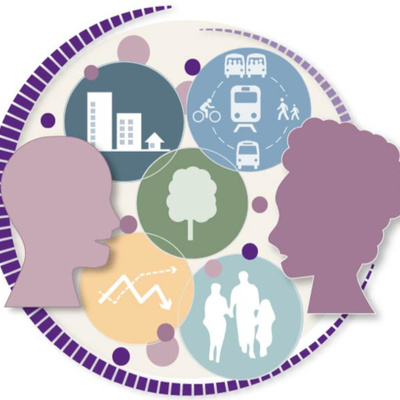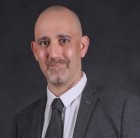Talking Transformation Podcast - The COVID Diaries
Gearing up for the New Normal

TTPod COVID Diary 12: "Integrating Health in Urban and Territorial Planning" [June 16th, 2020]. The TTPod looks at the recently published WHO and UN-Habitat report or sourcebook on urban and public health planning with Pamela Carbajal - one of the report co-ordinators. TTPod Summary
TTPod COVID Diary 11: “When the Streets Have No Names” The importance of addressing as the basis for responsive service delivery and governance [June 4th, 2020]. ESRI's Global Lead on Land Administration, Carsten Bjornsson talks to us about the challenges of track and trace and addressing. TTPod Summary
TTPod COVID Diary 10: "Driving to Florida!" Adapting our streets in the time of COVID [June 2nd, 2020]. Hear from Our Future Cities, Rashiq Fataar. He reflects on his experience and the principles of a publication: “Streets for Pandemic Response and Recovery”. So what is it we need to consider now and in the future?
TTPod COVID Diary Entry Number 9: "Gearing up for the New Normal" Town planners' perspectives on the road ahead for South Africas development industry [May 18th, 2020]. Hear from three town planners about their hopes and fears for a "new normal" way of working and what that means for the industy. TTPod Summary
TTPod COVID Diary Entry Number 8: "Deciphering De-densification" Spatial and socio-economic implications of urban density and accelerated informal settlement relocations [May 1st, 2020]. Hear from the Development Action Group and 1-1 Agency of Engagement as they discuss the pros and cons of density with particular reference to informal settlements in this COVID-19 response period. TTPod Summary
TTPod COVID Diary Entry Number 7: "On your marks, (re)set, GO!?" Considering the structural and institutional opportunities for socio-economic and spatial change Post-COVID [April 16th, 2020]. Ashraf Adam and Francois Viruly share thoughts about the extended lockdown and the wide reaching implications for institutions and the economy.
TTPod COVID Diary Entry Number 6: “Freetown and Land of the Free” Contrasts, commonalities and leadership in a time of Coronavirus [April 14th 2020]. Latest episode of TTPod COVID Diaries looks to Sierra Leone and mid-west USA and the responses of the cities of Freetown and Minneapolis (and to a lesser extent London). TTPod Summary
COVID "Ground Zero": - A visitor's guide [April 5th 2020]. Follow the COVID-19 conversations from around the globe. Today we look closer to home whilst reflecting on China's efforts and response as the first country to grapple with the debilitating impact of COVID-19.
TTPod COVID Diary Entry Number 4: "East meets West ...North and South" [March 29th 2020]. NYC joins the conversation and we revisit Hong Kong where things are moving quickly and Bucharest where 4th phase measures are days away.
TTPod COVID Diary Entry Number 3: "End of Days or New Horizons?" [March 28th 2020]. At a time of great uncertainty Prof Francois Viruly talks to us about the factors and opportunities that could shape future economic and property in the formal and informal sectors post-COVID 19.
TTPod COVID Diary Entry Number 2: “View from the Balcony - Hong Kong from on High" [March 25th 2020]. Eloise Rousseau who speaks to us from central Hong Kong.
TTPod COVID Diary Entry Number 1: "Nairobi and Bucharest Calling" [March 22nd 2020]. Listen to Herman Pienaar (Nariobi - UN Habitat) and Carli Venter (Bucharest - World Bank) reflecting on their adoptive cities responses to COVID 19.
About the Podcast
The recently launched Talking Transformation Podcast was five months old in December 2019! Fourteen episodes are in the bag and available to download and listen to free of charge! There's no charge or fee associated with the podcast! Slowly but surely an archive of material and perspectives is being made available to assist planners and others to reflect on and continue conversations that all too often are being forgotten about or missed in the daily activities.
It's been presented to provide a platform and a voice for built environment professionals and interest groups who are working towards transforming places and spaces in South Africa. And it's dedicated to the individuals and community groups who are driving the formal and informal process that shape South Africa's cities and spaces.
We're operating in an increasingly difficult global and national environment. Fake news, both the real and imagined, and populism are threats to our ability to communicate. Unemployment is sky rocketing. Commissions are exposing some scandalous activity within the state and corporate South Africa. The economy is failing and complex issues of housing, sanitation and land tenure remain perennial challenges to households, communities and institutions alike. The Talking Transformation Podcast is focused on reflecting on and celebrating achievements and milestones: the success stories and opportunities that are out there for us to all learn from.
As Talking Transformation Podcast anchor, Pete Ahmad says: "I've been a keen follower of podcasts for a number of years but it's always struck me that local, South African content about our towns and cities is in short supply. Lots of people come and visit and put us under an academic microscope but I'm not sure how many podcast about it. So the plan is that with the support of colleagues past and present and personalities from across the country we use the Talking Transformation pod to explore successes and review approaches used since 1994. Spatial transformation is big news right now...political destinies are being shaped by the successes or failures; critics suggest little has changed within our fragmented and racially divided spaces. There are just so many different elements and complexities at play and the aim is to break it down into a series of episodes for listeners to engage and digest diverse themes."
The podcast has already considered a range of topics including informal settlement upgrading, property markets, land and tenure reform, the National Development Plan and trauma and violence in communities. Skills development and the relevance and challenges of our traditional planning skills set have also been challenged in the series so far. Interviews have been concluded and lined up with some of the leading practitioners in the country across the public and private sectors, academies and the NGO spectrum.
"We are deliberately trying to balance the views of the private sector, academia and advocacy groups. Our aim is not to provide definitive answers but to provide a series of perspectives and reflections, allowing the listener to decide if it makes sense or not."
Those involved in the Talking Transformation podcast do so in a voluntary and personal capacity. No funds are generated, and time and recording infrastructure are from the team's resources.
Although the team have worked in different government and private institutions, non-government organizations and academia, none have any formal training or broadcasting background. "We record and prepare these episodes in our spare time to assist our listeners and our ourselves in coming to terms with the challenges at hand. As the project grows it has already exceeded our initial expectations. We will approach a number of professional registration bodies and see how we can use these to support the professional development certification."
The team involved want it to be a professional and quality presentation and they look forward to hearing from you with ideas on how they can improve their efforts and perspectives.
You can follow the podcast, and leave your vocal comments, if you want to contribute to a topic via https://anchor.fm/talking-transformation-po
You can also follow the podcast's activities via the twitter page: https://twitter.com/TalkingTransfo1
Information supplied by podcast owner



Comments